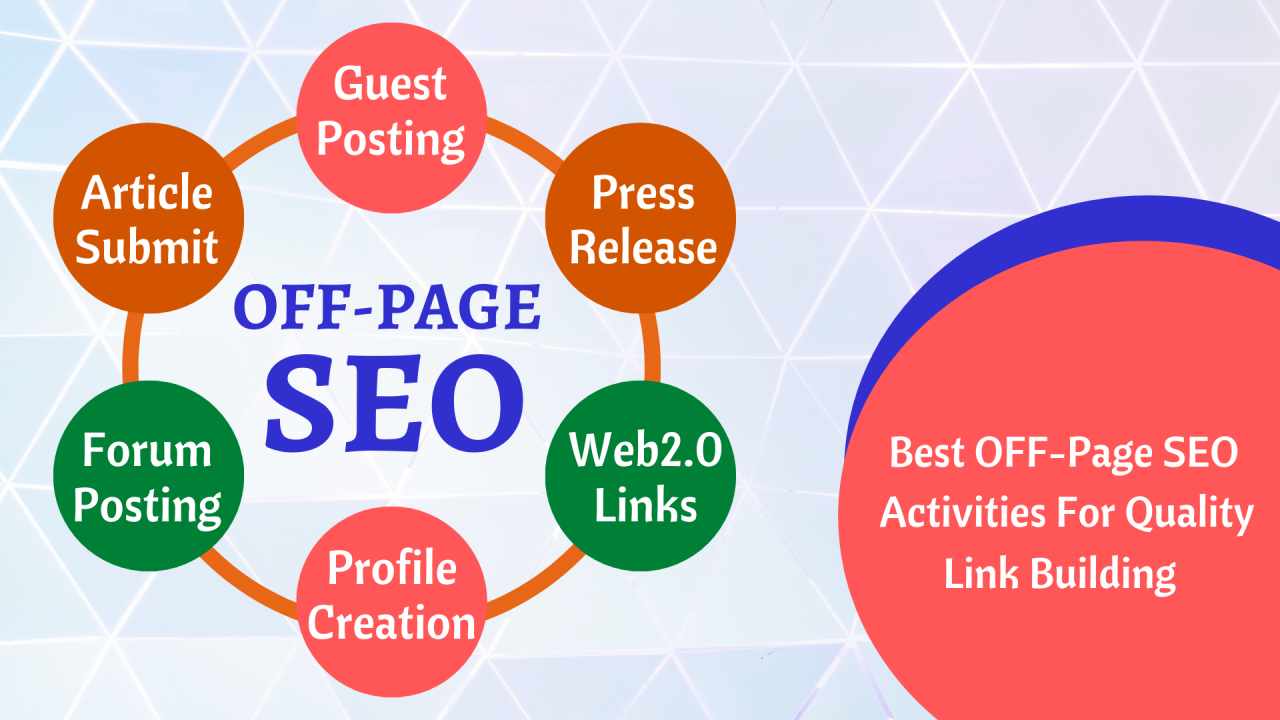Best Off-page SEO
In the dynamic and ever-evolving realm of search engine optimization (SEO), achieving a prominent online presence is paramount. While on-page optimization tactics like keyword research and content quality play a significant role in boosting your website’s visibility, off-page SEO is an equally essential component of the equation. Off-page SEO is a multifaceted strategy that focuses on enhancing your website’s credibility, authority, and relevance across the vast landscape of the internet.
Unlike on-page SEO, which involves optimizing your website’s internal elements, off-page SEO delves into activities that take place beyond the confines of your site. It encompasses a wide array of tactics aimed at building your website’s reputation and demonstrating its value to search engines like Google. The ultimate goal is to secure higher search engine rankings, drive organic traffic, and establish your website as an authoritative source within your niche.
We will embark on a comprehensive exploration of off-page SEO, uncovering its key components, best practices, and the pivotal role it plays in the competitive online arena. So, let’s dive deeper into the world of off-page SEO and discover how it can catapult your website to new heights of digital success.
What does off-page mean?
Off-page, in the context of search engine optimization (SEO), refers to all the activities and strategies that take place outside of your website to improve its visibility and reputation on search engines like Google. It involves optimizing factors that are not directly controlled on your website but have a significant impact on its search engine rankings and online authority.
Off-page SEO primarily focuses on building your website’s credibility and authority in the eyes of search engines and users. Key off-page SEO factors include:
Backlinks: A key component of off-page SEO is obtaining high-quality backlinks from other trustworthy websites. These links serve as “votes of confidence” for your website, telling search engines that the information on it is reliable and worthwhile.
Social Signals: Activity on social media platforms, such as likes, shares, and comments on your content, can influence your site’s visibility. Strong social signals indicate user engagement and can indirectly affect search engine rankings.
Online Reputation Management: Monitoring and managing your online reputation is crucial. Positive reviews and mentions across the web can boost your site’s credibility, while negative ones can harm it.
Content Marketing: Sharing valuable content through guest posting, press releases, and other content marketing strategies can help establish your authority and reach a broader audience.
In essence, off-page SEO is about building a positive online presence, gaining trust and recognition from other websites, and ultimately improving your search engine rankings. It complements on-page SEO efforts to create a well-rounded and effective SEO strategy.
What are offpage activities?
Off-page SEO activities are strategies and actions taken outside of your website to enhance its online visibility, reputation, and authority. These activities are crucial for improving your website’s search engine rankings and overall online presence. Here are some common off-page SEO activities:
Link Building: This is one of the most important off-page SEO activities. It involves acquiring high-quality backlinks from other reputable websites. Quality matters more than quantity; having authoritative and relevant websites link to your content can significantly boost your site’s SEO.
Guest Blogging: Writing high-quality guest posts for other websites in your industry can help you establish authority and build backlinks to your site. It’s a win-win strategy where you provide valuable content to other sites’ audiences while gaining exposure and links in return.
Social Media Marketing: Active engagement on social media platforms can indirectly impact your SEO. Sharing content, engaging with your audience, and building a strong social media presence can increase brand awareness and drive traffic to your site.
Social Bookmarking: Submitting your website’s content to social bookmarking sites like Reddit, Digg, or StumbleUpon can help expose your content to a broader audience. Be cautious not to spam these platforms; instead, focus on sharing genuinely valuable content.
Influencer Outreach: Collaborating with influencers in your niche can expand your reach and credibility. Influencers can promote your content or products to their loyal followers, increasing your brand’s visibility.
Content Marketing: Creating and promoting high-quality, shareable content can attract natural backlinks and social shares. Infographics, videos, blog posts, and other content formats can be powerful off-page SEO assets.
Brand Mentions: Even without links, mentions of your brand or website across the web can contribute to your online reputation and indirectly impact SEO.
